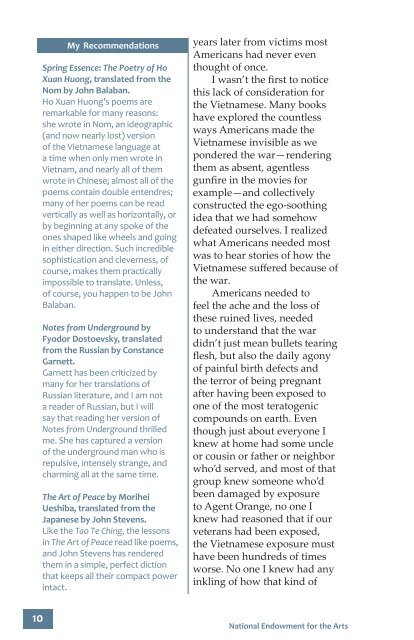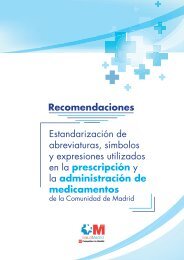lKd7nD
lKd7nD
lKd7nD
You also want an ePaper? Increase the reach of your titles
YUMPU automatically turns print PDFs into web optimized ePapers that Google loves.
My Recommendations<br />
Spring Essence: The Poetry of Ho<br />
Xuan Huong, translated from the<br />
Nom by John Balaban.<br />
Ho Xuan Huong’s poems are<br />
remarkable for many reasons:<br />
she wrote in Nom, an ideographic<br />
(and now nearly lost) version<br />
of the Vietnamese language at<br />
a time when only men wrote in<br />
Vietnam, and nearly all of them<br />
wrote in Chinese; almost all of the<br />
poems contain double entendres;<br />
many of her poems can be read<br />
vertically as well as horizontally, or<br />
by beginning at any spoke of the<br />
ones shaped like wheels and going<br />
in either direction. Such incredible<br />
sophistication and cleverness, of<br />
course, makes them practically<br />
impossible to translate. Unless,<br />
of course, you happen to be John<br />
Balaban.<br />
Notes from Underground by<br />
Fyodor Dostoevsky, translated<br />
from the Russian by Constance<br />
Garnett.<br />
Garnett has been criticized by<br />
many for her translations of<br />
Russian literature, and I am not<br />
a reader of Russian, but I will<br />
say that reading her version of<br />
Notes from Underground thrilled<br />
me. She has captured a version<br />
of the underground man who is<br />
repulsive, intensely strange, and<br />
charming all at the same time.<br />
The Art of Peace by Morihei<br />
Ueshiba, translated from the<br />
Japanese by John Stevens.<br />
Like the Tao Te Ching, the lessons<br />
in The Art of Peace read like poems,<br />
and John Stevens has rendered<br />
them in a simple, perfect diction<br />
that keeps all their compact power<br />
intact.<br />
years later from victims most<br />
Americans had never even<br />
thought of once.<br />
I wasn’t the first to notice<br />
this lack of consideration for<br />
the Vietnamese. Many books<br />
have explored the countless<br />
ways Americans made the<br />
Vietnamese invisible as we<br />
pondered the war—rendering<br />
them as absent, agentless<br />
gunfire in the movies for<br />
example—and collectively<br />
constructed the ego-soothing<br />
idea that we had somehow<br />
defeated ourselves. I realized<br />
what Americans needed most<br />
was to hear stories of how the<br />
Vietnamese suffered because of<br />
the war.<br />
Americans needed to<br />
feel the ache and the loss of<br />
these ruined lives, needed<br />
to understand that the war<br />
didn’t just mean bullets tearing<br />
flesh, but also the daily agony<br />
of painful birth defects and<br />
the terror of being pregnant<br />
after having been exposed to<br />
one of the most teratogenic<br />
compounds on earth. Even<br />
though just about everyone I<br />
knew at home had some uncle<br />
or cousin or father or neighbor<br />
who’d served, and most of that<br />
group knew someone who’d<br />
been damaged by exposure<br />
to Agent Orange, no one I<br />
knew had reasoned that if our<br />
veterans had been exposed,<br />
the Vietnamese exposure must<br />
have been hundreds of times<br />
worse. No one I knew had any<br />
inkling of how that kind of<br />
10<br />
National Endowment for the Arts



